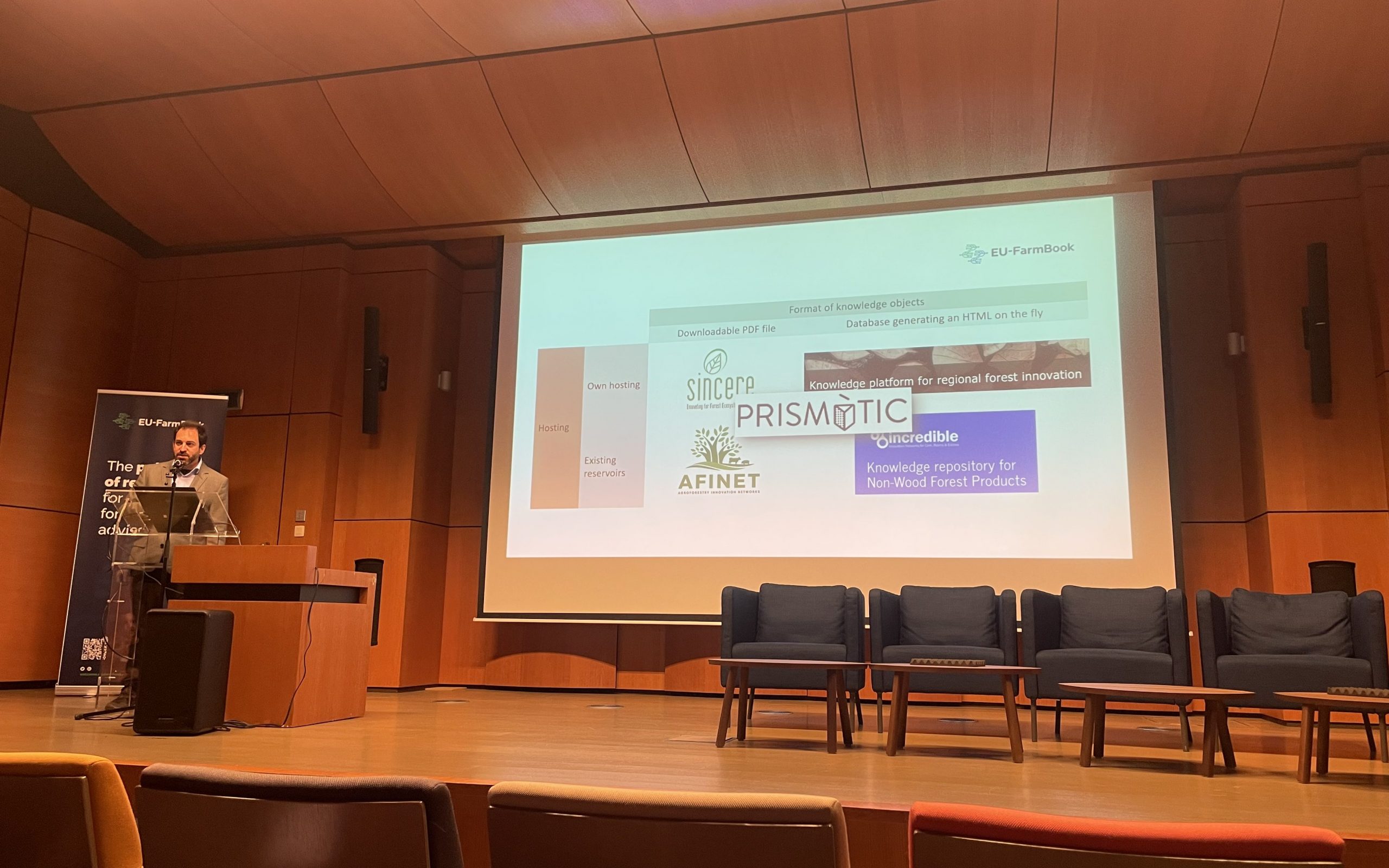Prismàtic travels to Brussels to team up with EU-FarmBook, a cutting-edge European network for forest and agricultural know-how
The EU-FarmBook project aims to be a one-stop-shop where informative materials generated in projects like Prismàtic can be found.
Prismàtic is expanding internationally beyond Catalonia through collaboration with EU-FarmBook, a new seven-year project funded by the European Union. EU-FarmBook aims to be a one-stop-shop where informative materials generated in European projects, based on scientific results in the agricultural and forestry fields, can be found. This portal seeks to connect project participants and professionals in these sectors to create a large community. To achieve this, its contents will be open and available in all official EU languages. The official launch event of the project took place on February 21st in Brussels, where over eighty journalists, researchers, technicians, politicians, and other people involved in the world of forests and agriculture gathered to meet and share their needs and proposals to shape the platform. Prismàtic, in particular, contributed its knowledge and experience of the community behind its digital tools, an area to which it devotes a lot of energy, and which largely sets it apart from other existing natural heritage knowledge transfer platforms. The aim is for Prismàtic to contribute to EU-FarmBook during these seven years to eventually publish some of its agricultural and forestry factsheets on the platform.
The initiative for this ambitious project is coordinated by Ghent University (Belgium) and consists of a consortium of 29 partners from 18 countries, including 17 international network organizations that act as ambassadors for EU-FarmBook in their respective regions. One of these ambassador organizations is the European Forest Institute (EFI), which specifically invited Prismàtic to take part in the launch of EU-FarmBook.

The future of agricultural and forestry innovation lies in the digital realm
EU-FarmBook is materializing to put a great idea to the test: can tangible results from EU-funded research and innovation projects be gathered and organized into an intuitive platform useful for farmers, foresters, and advisors throughout Europe? The challenges to achieve this are significant - issues with data quality and compatibility, language barriers, intergenerational considerations, and more. But those behind EU-FarmBook believe that the future of agricultural and forestry innovation in Europe is decidedly digital. They also argue that we urgently need a much greater and better digital exchange of knowledge between regions and member states of the EU, as well as between the various stakeholders in agriculture and forestry: researchers, farmers, foresters, policymakers, SMEs, and advisors. To ensure that no one is excluded from the digital EU-FarmBook community, the website's content will be available in all EU languages, automatically translated to facilitate understanding and communication among all users.
"The future of agricultural and forestry innovation in Europe is digital, and it requires a much greater and better digital exchange of knowledge among EU regions and Member States, as well as among the various stakeholders in agriculture and forestry."
According to Eduard Mauri, involved in repositories and one of the Spanish forest ambassadors of EU-FarmBook, there is a trend among EU-funded projects and research centers to create their own repositories for the results obtained, in order to publish gray literature while retaining visual identity and personalizing the platform according to specific needs. However, this practice can result in the FAIR principles (Findable, Accessible, Interoperable and Reusable), a requirement for EU-funded project publications, not being respected and the community of users being poorer and smaller.

“Connecting these repositories, such as Prismàtic, with other high-quality ones allows us to comply with the FAIR principles, increase the dissemination of knowledge, ensure the long-term maintenance of information, and access this material through our own website thanks to an application programming interface (API). For publications resulting from multi-actor projects in the agricultural and forestry fields, EU-FarmBookoffers all these benefits. Personally, I will not create any other repository for the projects I work on again!”
EDUARD MAURI, EU-FarmBook ambassador and EFI expert.
What's next for the project?
EU-FarmBook is the result of two Horizon 2020 sister projects funded by the EU that have brought together various partners from 28 organizations across 16 countries.
Now, after this productive and creative meeting in Brussels, the EU-FarmBook team has the ball in their court and will start working intensively with the proposals and experiences of all the actors involved to advance the platform, which is still in a pilot version. Fortunately, they do not start from scratch, as EU-FarmBook is the result of two Horizon 2020 sister projects funded by the EU, EURAKNOS and EUREKA,, which have brought together several partners from 28 organizations in 16 countries to work together using a multi-actor approach.

In this first working phase, which will last until 2025, EU-FarmBook will focus on developing the website and analyzing potential users of the platform. By summer 2027, all technical aspects and improvements of the knowledge exchange with regional repositories and European projects should be completed. From there, they will have the following two years (2028 and 2029) to maximize the dissemination of the project and promote its use.
Thanks to all this intense and careful work, in a few years the case studies of the agricultural and forestry from Prismàtic will have a new life and will be available on their website for the entire European community. This way, Prismàtic will continue to weave and promote its international reach, positioning itself as a regional reference in the field of knowledge transfer on natural heritage and biodiversity.
Would you like to stay up to date on the latest news and expertise in research and management in Catalonia? Sign up for the Prismàtic newsletter to stay informed about natural heritage and biodiversity topics!
More information:







